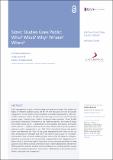Files in this item
Slavic studies goes public : who? what? why? where? when?”
Item metadata
| dc.contributor.author | Donovan, Victoria Sophie | |
| dc.contributor.author | Rann, James | |
| dc.contributor.author | Tsymbalyuk, Darya | |
| dc.date.accessioned | 2021-07-26T14:30:02Z | |
| dc.date.available | 2021-07-26T14:30:02Z | |
| dc.date.issued | 2021-07-14 | |
| dc.identifier | 272921719 | |
| dc.identifier | 3a17efc7-12e7-4699-8ad5-ebdeae03476d | |
| dc.identifier.citation | Donovan , V S , Rann , J & Tsymbalyuk , D 2021 , ' Slavic studies goes public : who? what? why? where? when?” ' , Modern Languages Open , vol. 1 , 4 . https://doi.org/10.3828/mlo.v0i0.349 | en |
| dc.identifier.issn | 2052-5397 | |
| dc.identifier.other | ORCID: /0000-0001-5987-0965/work/97885217 | |
| dc.identifier.other | ORCID: /0000-0002-8293-5541/work/97885631 | |
| dc.identifier.uri | https://hdl.handle.net/10023/23633 | |
| dc.description.abstract | Public engagement, impact, and knowledge exchange are concepts that today rank highly on research agendas across the UK. Yet the discussion of what constitutes engagement, on the politics and practicalities of building collaborations with non-academic partners, and on the ethics of conducting such work are still at their very earliest stages. Emerging from a British Academy-funded workshop, “Slavic Studies Goes Public: Creating an ECR Network in the Public Humanities,” this series of essays and critical-creative works — collaborations at the boundary of academic writing and artistic practice — explores what we see as some of the most important questions relating to public engagement in our field. What institutional factors and politics inform and determine the “who” of our public engagement work? How can the us/them dichotomy be rethought and with it the idea of “giving voice” to “voiceless” communities? How can those leading projects be sure that the legacy or change is desired by or necessary for the communities engaged? When does engagement end? When should it never have begun? Participants at the workshop responded to these questions in six reflective essays and three critical-creative collaborations. Rather than offering definitive answers, we hope that the workshop and this series will form a point of departure, engendering further conversations, collaborations, and creativity around Modern Languages and engagement. | |
| dc.format.extent | 6 | |
| dc.format.extent | 371189 | |
| dc.language.iso | eng | |
| dc.relation.ispartof | Modern Languages Open | en |
| dc.subject | PG Slavic, Baltic, Albanian languages and literature | en |
| dc.subject | T-NDAS | en |
| dc.subject.lcc | PG | en |
| dc.title | Slavic studies goes public : who? what? why? where? when?” | en |
| dc.type | Journal article | en |
| dc.contributor.sponsor | The British Academy | en |
| dc.contributor.institution | University of St Andrews. Russian | en |
| dc.contributor.institution | University of St Andrews. School of International Relations | en |
| dc.identifier.doi | 10.3828/mlo.v0i0.349 | |
| dc.description.status | Peer reviewed | en |
| dc.identifier.grantnumber | BARSEA19\190060 | en |
This item appears in the following Collection(s)
Items in the St Andrews Research Repository are protected by copyright, with all rights reserved, unless otherwise indicated.

